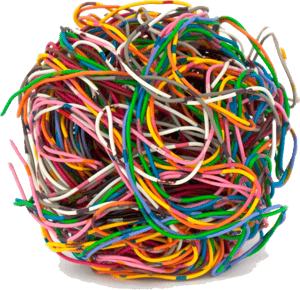Helping your customer make sense of complexity
September 3, 2019

 Making a buying decision has never been more complicated. Your customers have access to an overwhelming amount of information - often inconsistent, and frequently false or incomplete. They seek consensus when making buying decisions - but have to somehow align a growing number of stakeholders with often conflicting priorities.
Making a buying decision has never been more complicated. Your customers have access to an overwhelming amount of information - often inconsistent, and frequently false or incomplete. They seek consensus when making buying decisions - but have to somehow align a growing number of stakeholders with often conflicting priorities.
And they have to navigate an increasingly complex and non-linear buying journey that often twists and turns and is as capable of going sideways or backwards as it is going forwards in response to new information, new circumstances or the involvement of new members of the decision group.
Faced with this complexity, we shouldn’t be surprised that sales cycles are lengthening, that win rates are declining or that the most common outcome of even an apparently well qualified sales opportunity is for the customer to decide that their easiest path is to simply stick with the status quo, after all...
Sell harder - or sell smarter?
It seems to me that there are two diametrically opposed responses to this situation. The traditional approach would be to somehow equip our salespeople to “sell harder” and to polish up their closing techniques. But this is a mindset that is now long past its best-before date.
The alternative approach - championed by the likes of Gartner and Dave Brock, amongst others - is to recognise that our goal as salespeople must first-and-foremost be to help our customers to make sense of all this complexity, and to help them navigate their buying journey to a successful conclusion.
Adopting this role of salesperson as sense-maker requires some significant changes in the traditional sales mindset. Instead of a seller of our pre-defined “solutions”, we need to see ourselves as solvers of our customer’s problems. We need to be able to put ourselves in their shoes. We need to demonstrate emotional intelligence, empathy and business acumen.
Guiding our customer
We need to guide our customers in making sense of all the information that is available to them. Although some level of product familiarity will still be required, it will be far more valuable to be an expert in the issues our customers are likely to be facing - both recognised and as-yet unrecognised - and to know how similar organisations have successfully dealt with similar situations, and how they managed to navigate past the inevitable roadblocks that stood in their way.
Stories and insights will have far more impact than data points and product specifications. Our collective experience of similar situations can bring value-creating insights and moments of clarity that our potential customers could never achieve through a narrow introspection of their own situation.
If our customers are involved in an unfamiliar purchase, their standardised procurement processes (assuming they even exist) will almost inevitably leave them with blind spots that our experience can illuminate. We can help them anticipate and address the inevitable pitfalls. We can help them avoid predictable errors.
We can even help our sponsor to cope with the complexities of getting a large group of stakeholders with different priorities and perspectives to align around the need for change, a common vision of a solution, a sense of urgency, and the ability to answer the inevitable questions around ‘what’s in it for me, my department and for the company as a whole?’
The risk of ignoring complexity
Salespeople can get away with ignoring complexity (and often do) if they are selling a simple transactional offering or supporting a familiar buying decision. But if your salespeople are involved in complicated decision environments or in purchases that are unfamiliar to the potential customer, they cannot afford to ignore its impact.
Hoping complexity will go away or somehow resolve itself without our intervention probably isn’t going to be a winning strategy. Hoping that the customer will somehow educate themselves out of the complexity challenge is unlikely and even if true, would substantially reduce our opportunity to influence.
That’s why your salespeople have to be (or become) skilled sense makers. But there’s a problem: there’s a cohort of salespeople - some of whom who have been successful in less demanding environments - who simply don’t have the empathy, the emotional intelligence or the business acumen to pull it off. Some may even be in denial about the need for sense-making in the first place.
Some of your salespeople will have a natural talent for coping with complexity. Others - with the right attitudes and foundational capabilities - can be developed through continuous coaching. But what are we going to do with the salespeople who prove to be incapable of truly helping their customers make sense of the complexities of the world around them?
Or is their ultimate fate simply an inevitable Darwinian consequence of an inability to evolve in a changing world?
BTW, I strongly recommend Dave Brock’s original article on the subject.
ABOUT THE AUTHOR
 Bob Apollo is a Fellow of the Association of Professional Sales, a member of the Sales Enablement Society, a founding contributor to the International Journal of Sales Transformation and the Sales Experts Channel and the founder of Inflexion-Point Strategy Partners, the leading UK-based B2B value-selling experts.
Bob Apollo is a Fellow of the Association of Professional Sales, a member of the Sales Enablement Society, a founding contributor to the International Journal of Sales Transformation and the Sales Experts Channel and the founder of Inflexion-Point Strategy Partners, the leading UK-based B2B value-selling experts.
Following a successful corporate career spanning start-ups, scale-ups and market leaders, Bob is now relishing his role as a pro-active advisor, coach and trainer to high-potential B2B-focused sales organisations, systematically enabling them to transform their sales effectiveness by adopting the proven principles of value-based selling.


Comments